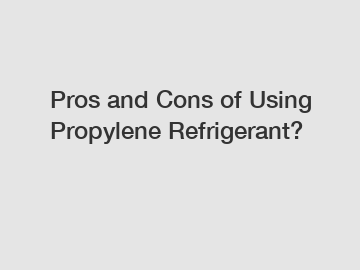Pros and Cons of Using Propylene Refrigerant?
Pros and Cons of Using Propylene Refrigerant
Pros
- Environmentally friendly: Propylene refrigerant is a hydrocarbon-based refrigerant that has low ozone depletion potential and low global warming potential, making it an environmentally friendly choice compared to traditional refrigerants like CFCs and HCFCs.
- Energy efficient: Propylene refrigerant has excellent thermodynamic properties, which can result in energy savings and improved system performance. This can lead to lower energy costs and reduced carbon emissions.
- Safe to use: Propylene refrigerant is non-toxic and non-flammable, making it a safer option for both the environment and individuals handling the refrigerant. This can reduce the risk of accidents or health hazards associated with other refrigerants.
Cons
- Flammability: While propylene refrigerant is considered non-flammable under normal operating conditions, it can become flammable in certain situations, such as leaks or high temperatures. This can pose a potential safety risk if proper precautions are not taken.
- Cost: Propylene refrigerant may be more expensive upfront compared to traditional refrigerants. The initial cost of switching to propylene refrigerant can be a barrier for some users, especially for those with tight budgets.
- Compatibility: Propylene refrigerant may not be compatible with all existing HVAC systems. Retrofitting or replacing equipment to accommodate propylene refrigerant can add to the overall cost and complexity of the transition.
If you want to learn more, please visit our website c2h4 specialty gas, Ch4 Gas for Sale, sulfur hexafluoride sf6.
Additional reading:State and Regional Regulations Related to SF6 Emissions ...
Theophylline
"Why" silicone oil is great for rubber and Armor All isn't
Global Zirconium Phosphate Market 2023 by ...
The Rewards of Incorporating Epoxy Silane Coupling Agents in Your Industrial Processes
California Dental Association - Becoming a Member ...
All Products

What is the Advantage and Disadvantage of electrical cryotherapy chamber
How to Select Re-dispersible Polymer Powder for ETICS/EIFS Available for Purchase?
4 Different Forms of Magnesium: Which Is Best For Your ...
Re-dispersible Polymer Powder vs. Traditional Tile Adhesives: Key Differences
The Advantages of Incorporating Methyl Hydroxyethyl Cellulose Chemical For Tile Adhesive Manufacturers
How Methyl Hydroxyethyl Cellulose Benefits Tile Adhesive Makers
History - Titanium Dioxide Whites
Related Articles
If you are interested in sending in a Guest Blogger Submission,welcome to write for us!












Comments
0